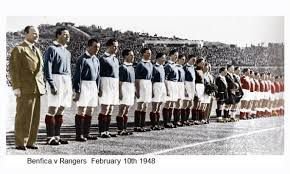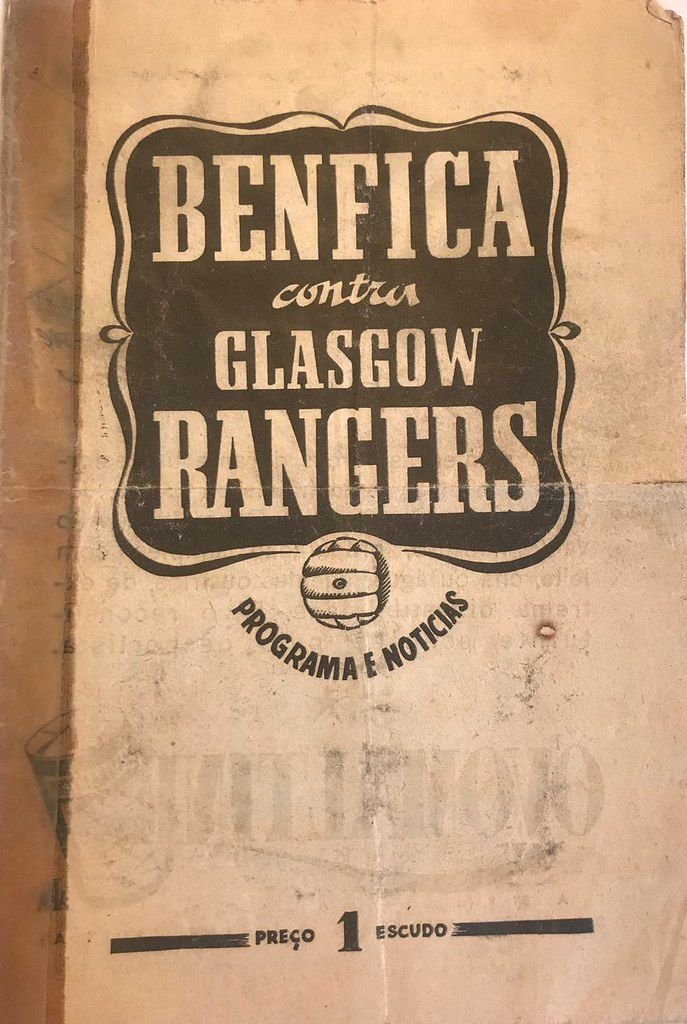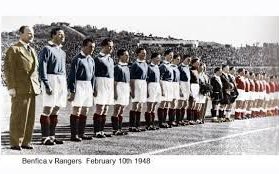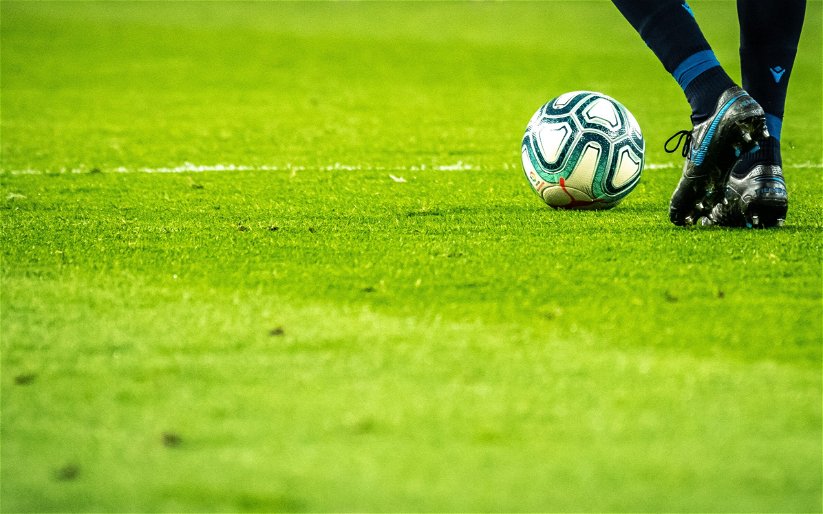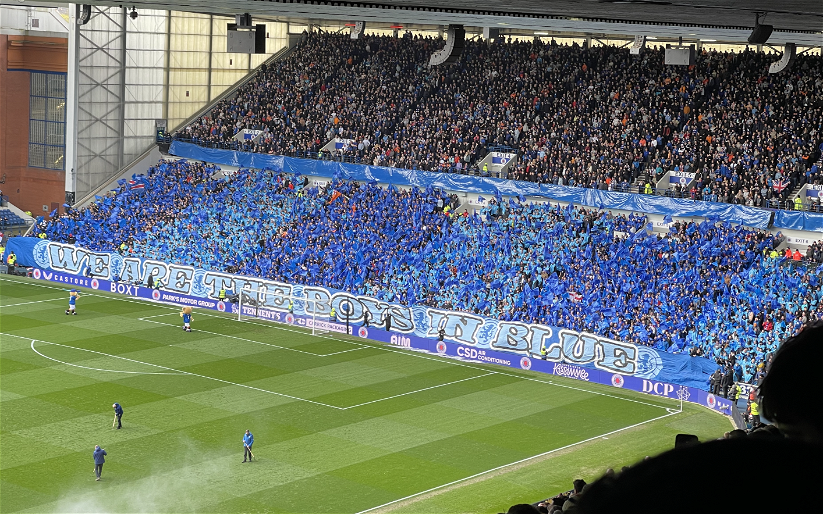By Alistair Aird
Rangers meet Benfica in the last 16 of the Europa League. At stake is a place in the quarter-finals, and the draw immediately took fans back to the two epic encounters in season 2020/21. But Rangers had faced the Portuguese giants before that, and the featured match for this Blast from The Past article is a friendly that took place in Lisbon on 10 February 1948. It would prove to be a memorable experience on and off the pitch for one of the most totemic figures in the history of Rangers Football Club, Willie Waddell.
Having dominated the regionalised wartime competitions, Rangers were still at the forefront when football became a national sport again after the cessation of hostilities at the end of World War II. League champions in season 1946/47, Bill Struth’s side had also added the inaugural Scottish League Cup to their Roll of Honour. And they were going toe-to-toe in the battle for supremacy with Hibernian when it was decided to travel to Lisbon in February 1948 to play Benfica in a friendly.
They did so top of the Division One table, although a 1-0 defeat at Easter Road on 31 January had cut their advantage to a solitary point. It was only the second time that Struth’s side had tasted defeat in the league, and indeed it was only the third game in in which they had dropped points. Of the 19 league matches played prior to that trip to Edinburgh, 17 had been won, with an away defeat against St Mirren and a 1-1 draw at home to Morton the only blemishes.
The weekend prior to the trip to Portugal, goals from Willie Thornton, Willie Waddell, Sammy Cox and Eddie Rutherford had been sufficient to knock Leith Athletic out of the Scottish Cup at Ibrox. Lewis Goram, father of arguably Rangers’ greatest ever goalkeeper, Andy Goram, was between the sticks for the visiting team.
The match against Benfica was played at the National Stadium in Lisbon. All members of the famous Iron Curtain defence – Brown, Young, Shaw, McColl, Woodburn, and Cox – were present in the Rangers starting XI, and the forward line comprised of Willie Waddell at outside right, Torry Gillick at inside-right, Willie Thornton at centre forward, Jimmy Duncanson at inside-left, and Jimmy Caskie at outside left. The referee was an Keeney from England.
The headline in the Glasgow Herald – Rangers Disappoint Lisbon Crowd – suggested that the visitors hadn’t played too well, but after the game, captain Jock Shaw had suggested that was more to do with the conditions. The pitch had been baked hard by the sun, and soaring temperatures created an environment that the Rangers players were certainly not used to playing in.
Benfica started brightly but were let down by profligate finishing. In contrast, Rangers offered little threat going forward, with the home goalkeeper, Pinto Machado, only have two saves to make. But he was beaten after 35 minutes by a goal that was trademark of that era: Waddell was the architect, Thronton the executioner.
In the second half, Rangers seemed to retreat again, and it was reported that the Benfica outside left, Batista, passed up several chances to score in the second half. With 15 minutes to go, Arsenio Durate, who scored 360 goals in 446 competitive games for Benfica, rattled a shot against the post, but after 84 minutes, it was Rangers who scored again.
Waddell claimed another assist – Duncanson was the man to score on this occasion – and a couple of minutes later, McColl and Gillick combined, with the latter applying the finishing touch. The report in the Glasgow Herald noted that these were ‘Rangers’ only two real chances in the second half.’
With two assists, it was no surprise that Waddell was among the Rangers players who had impressed – the others were Brown, Young, McColl, Gillick and Caskie – and the winger also enjoyed the trip off the park too.
Working on the charter flight was a young lady called Hilda Steele. The pair struck up an instant rapport, and they were married on 14 March 1949. They had three children, Ronnie, Peter, and Ailsa. There were also six grandchildren – four girls and two boys – and to date, eight great grandchildren.
Mrs Waddell was nothing like the modern-day WAGs. She was classy, always well-dressed, and she made sure that she spoke properly. She also made sure her grandchildren did that to any time they attended games at Ibrox.
Hilda accompanied Willie to every single game, and still went to Ibrox after he died in 1992. And she kept scrapbooks that chronicled Waddell’s career, not just the articles he was mentioned in, but also the ones he wrote when he became a journalist after he hung up his boots in 1956. She was very proud of her husband, and it is easy to see why.
A first team debutant at the age of 17 – Waddell scored in a 1-0 win over Arsenal at Ibrox – he made 599 appearances as a Rangers player.
These are broken down as follows:
(*) 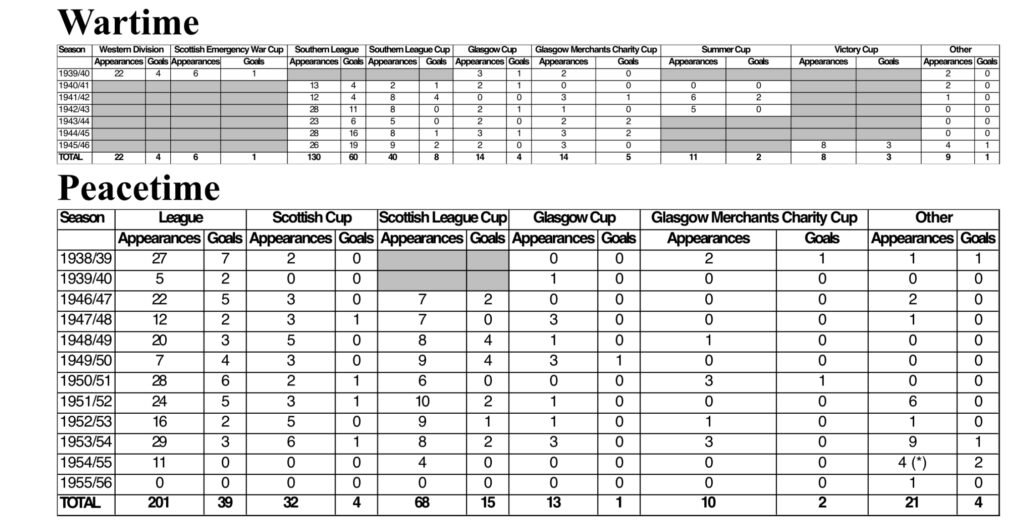 one appearance as substitute. Waddell came on for Willie Rae during a 4-1 defeat against Racing Club de Paris on 19 May 1955.
one appearance as substitute. Waddell came on for Willie Rae during a 4-1 defeat against Racing Club de Paris on 19 May 1955.
This was an era when assists weren’t documented. Had they been, then Waddell’s numbers would without doubt have been in excess of 200.
Waddell was born in Forth in Lanarkshire on 7 March 1921, he was nicknamed ‘The Deedle’ which was apparently coined from the rhyming slang ‘Deedle Dawdle’. Although his career was interrupted by the outbreak of World War II, Waddell played a vital role in Bill Struth’s side as they emerged from the war years to dominate Scottish Football alongside Hibernian and Hearts. Celtic were also-rans, incidentally, finishing as low as 12th in season 1947/48, staving off relegation by just four points.
Although regarded as more a creator of goals than a goalscorer, Waddell’s return of 153 goals in those 599appearances is still very respectable. Among those goals were a hat-trick against Clyde in the League Cup on 2 October 1948, and the winning goal in the New Year’s Day Old Firm match at Ibrox in 1951. Waddell also scored two of the eight goals netted when Rangers humbled Celtic 8-1 on New Years Day 1943.
Two of the goals scored against Clyde were from the penalty spot. Waddell scored a few from 12 yards in his time at Rangers – 13 of the 16 he took – but he famously missed one in the friendly against Moscow Dynamo at Ibrox in 1945.
Remarkably, a crowd of 95,000 turned up for what was a midweek game. Kartsev put the visitors in front after only two minutes, but Waddell had an opportunity to restore parity just three minutes later. Charlie Watkins was brought down in the box. However, although he struck his penalty hard, it was straight at Tiger Khomich, and the Moscow Dynamo keeper diverted the ball on to the crossbar.
Kartsev doubled Dynamo’s lead midway through the first half, but Jimmy Smith reduced arrears before half time before a penalty kick from George Young after 75 minutes eked out a 2-2 draw.
Waddell’s final appearance for Rangers came on 12 October 1955. He wore the number 11 jersey as Rangers defeated Manchester City 2-1 at Maine Road. Don ‘The Rhino’ Kichenbrand made his debut against a City side featuring one Don Revie. Bert Trautman was in goal for the home side. Waddell was most likely chosen to play as the regular outside left, Johnny Hubbard, hadn’t returned in time from Copenhagen. Alongside George Young, Hubbard had represented the Scottish League against the Danish League in Copenhagen, but their flight home had been delayed due to fog.
In addition to winning 17 caps for Scotland, Waddell won four league titles, two Scottish Cups, four Southern League Championships, one Scottish Regional League (Western Division), three Southern League Cups, one Summer Cup, one Victory Cup, and one Scottish Emergency War Cup. Waddell also played his part in five Glasgow Cup wins and six successes in the Glasgow Merchants Charity Cup.
Remarkably, Waddell never won a Scottish League Cup medal. The tournament started in season 1946/47, but Waddell missed the final against Aberdeen. He was absent again when Rangers defeated Raith Rovers to win the trophy in season 1948/49, and the only League Cup Final he played in was the 3-2 defeat against Dundee in October 1951.
After embarking on a career in journalism, Waddell led Kilmarnock to the league title in season 1964/65. And in December 1969, he replaced Davie White as Rangers manager. In his time at the helm, Waddell ended a four-year wait for a major honour when he audaciously selected 16-year-old Derek Johnstone for the League Cup Final against Celtic in October 1970. Johnstone scored the winning goal.
To date, Waddell is the only Rangers manager to have led the club to a major European trophy, the Light Blues defeating Moscow Dynamo 3-2 in the Final of the European Cup Winners’ Cup in Barcelona in 1972. Waddell also served the club as General Manager and Vice Chairman, and he was instrumental in the redevelopment of Ibrox Stadium following the Ibrox Disaster in January 1971. The state-of-the-art arena we have today is one of a number of Waddell’s legacies.
Despite being such an important figure in Rangers’ history, Waddell was a very private man. He had a reputation of being stern and hard, but to his family was the softest, gentlest man. Indeed, there were members of his family who had no idea how important a man he was or what he had achieved. His grandchildren would watch games from the Director’s Box and thought nothing of it. To them it was normal.
The first leg of the Benfica tie takes place on what would have been Willie Waddell’s 103rd birthday, and the second leg is on what would have been the Waddell’s 75th wedding anniversary. What better way to mark the occasion than for Mr Waddell’s beloved Rangers to swat aside another challenge in their pursuit of honours. He is part of the fabric of the club, and his contribution to our history will never be forgotten.
William Tweedie Waddell, legend then, legend now, legend forever.
